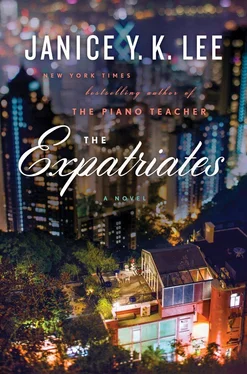“If anything happened to Dorothy, I would kill myself, and I’m not being melodramatic,” says Olivia. “She’s the only thing I’m living for.”
“We have to find more to live for,” Hilary says.
“You’re going to become a mother,” her friend replies. “You’ll understand. It’s the only thing that matters.”
Hilary ruminates on this, rolls it around her head, finds the thought pleasing. “I would like that to be true,” she says. “I would like that very much.”
SHE FINDS HER MOTHER, tells her she’s feeling unwell and has to leave. There’s a flash of disappointment in her mother’s face (Mercy, flaking again, if there’s a verb for flaking in Korean), but it passes in an instant, and she nods her head and says, of course, go home.
Mercy grabs her purse and exits through the staff door. In the hallway, she jabs the button for the elevator, willing it to come quickly. Inside, a musty fan circulates dusty air in the fluorescent light. There’s an old mirror on the wall, and she looks at herself. She looks normal. She looks fine. She’s dodged a bullet. Margaret may have seen her, but she might not have recognized her.
Outside, two women are smoking, talking. She waits for a taxi next to them as they talk idly about maybe leaving the party. Then they bring up the Reades and their situation.
“You never get over something like that,” the Asian woman says. “Most of those marriages don’t make it.”
“She was always perfect,” says the white woman, not unkindly.
Mercy strains to hear. She wonders if they will bring her up, the guilty, the other, the never-mentioned. Before she can hear any more, a taxi passes, and she runs after it, arm aloft to flag it. She runs away and disappears.
MARGARET IS DRUNK, for the first time since G was lost. Really drunk. It snuck up on her, like most drunken states, and by the time she realized, it was too late. Clarke keeps giving her sympathetic glances, and she feels ashamed before her in-laws.
She escapes to the bathroom and sits down on the toilet. She puts her palms on the opposite walls of the stall to try to stop the spinning. She tries to catalogue, as if that will make her feel better. She had a glass of champagne, a glass of wine after, and then another with Frannie Peck. There may also have been a shot of vodka, pressed on her by Clarke’s colleagues, a hard-partying crew. She was feeling good, feeling buzzed, until all of a sudden she felt rotten.
And there is something else, a niggling feeling that she’s missed something, or that something is wrong. She can’t put her finger on it.
She gets up, stumbles as she tries to pull down her underwear. What a mess she is.
She pees, thickly, hoping that at least some alcohol is leaving her body.
What is the thing that is wrong? What is she missing?
Mercy.
She saw Mercy. Now she is sure of it.
She has not thought about the girl in so long. She put her out of her mind, because what was the point? Now she remembers the girl walking fast, head down, going to the kitchen. She was in a waiter’s outfit, so she must have been working.
The white-hot hatred she felt toward the girl has cooled over the past year. When she thinks of her now, she can have moments of empathy. What is it like to have caused such a seismic change in someone else’s life? What is she doing now? Has she moved on? She doesn’t feel sympathy, but she doesn’t feel an active enmity. She wished her dead for a long time, but Dr. Stein told her that was not a path forward.
She wishes she weren’t so drunk.
She rises and walks unsteadily out the door to wash her hands.
Someone comes in.
“Oh, hi,” she says, trying to speak clearly. It’s Hilary’s friend, the elegant Chinese woman.
“What a wonderful party,” the woman says. “Thank you for having me.”
“Not at all.” She wipes her hands on a paper towel and walks out to find Clarke. It seems imperative that she find him.
“Clarke!” she calls when she sees him across the room. “Clarke!”
He sees her and looks concerned. “Are you okay?” he says. “You should drink some water.”
“I saw her,” she says. “I saw her!”
“Who?”
“Mercy! I saw Mercy!”
“Mercy?” Clarke doesn’t recall, and then his face changes when he realizes whom she is talking about. “What the hell are you talking about?”
“Mercy was here! She was working! She went into the kitchen!”
“What?” he says. “No, not possible. What would she be doing here?”
“I don’t know, but I saw her! Do you think I should find her?”
“Why would you do that?” he asks.
“I don’t know! I just want to know why she’s here!”
Around them, people are listening with great interest. It’s not often one gets a front-row seat to a full-blown family drama.
Clarke notices, takes her by the arm, and leads her away.
“You’ve drunk too much,” he says. “I think you should sit down with my mother and drink some water.”
“NO!” she shouts. “I’m going to find that girl and see why she’s here!” She shakes him off and runs to the kitchen and flings open the door. “Mercy!” she shouts. “Mercy! Are you here?”
PERFECT MARGARET READE is creating a spectacle. Hilary has never seen anything like it. She has clearly had too much to drink and is causing a commotion in the kitchen, yelling out the name of the girl, Mercy, the girl who was watching G when he disappeared. People have stopped talking and are watching Margaret scream and shout.
Clarke goes over and grabs Margaret and brings her to a chair, calming her down. She’s crying and wailing quite loudly. He gestures to his mother to get the children away, as they are running toward their mother. He sits down next to Margaret and covers her with his jacket, talking to her quietly.
Hilary looks at Olivia, nods, and quietly they make their way out.
VISIBLY PREGNANT NOW, Mercy is the darling of all the elderly people she sees on the street. People coo at her, try to touch her belly, give her unsolicited advice in elevators. She never knew what a pass pregnant women get in society.
Her mother has been feeding her, both with home cooking and out at restaurants. She has been eating spicy naengmyun , mung-bean pancakes, plenty of kimchi, and she has developed an intense craving for the braised sea cucumbers at a small Szechuan restaurant in Causeway Bay. Her mother funds all this eating with the revelation of a second nest egg, kept hidden from her father. “I’m not stupid,” she says. “I hide a lot.”
Mercy looks down at her belly with wonder. She can feel the flutters now, small touches from inside her that are growing stronger. Apparently the baby will also hiccup and somersault in the womb.
Her mother has been here for a few months and has acclimated to Hong Kong life. She has found a Korean church and has been trying to get Mercy to go.
“You want me to go like this?” Mercy asks, pointing to her stomach. “Your unmarried daughter?”
“I don’t care,” her mother says. “God is for everyone.”
Which is how she finds herself one Sunday attending a church that has set up in an office building in North Point. Most of the people her mother introduces her to are welcoming and nice.
“Columbia joropseng ,” says her mother proudly to everyone they see. Columbia graduate. Ivy League. Understandable in any language.
The place is filled with tacky calendars from small Korean businesses and cheap ugly chairs, and while Mercy would have scoffed at it a year ago, it appeals to her now. It’s so comforting. They sit down and listen to the sermon. Mercy’s Korean is good, and she can understand most of what the minister is saying. Today his sermon is about forgiveness. She looks around at all the Koreans in the room. She has spent so much time with the young American crowd it’s a relief to see her other kind of people here. She recognizes these people — the middle-aged women with the perms and sensible shoes, the stylish young moms, the salaryman bankers. She knows them. They know her.
Читать дальше












